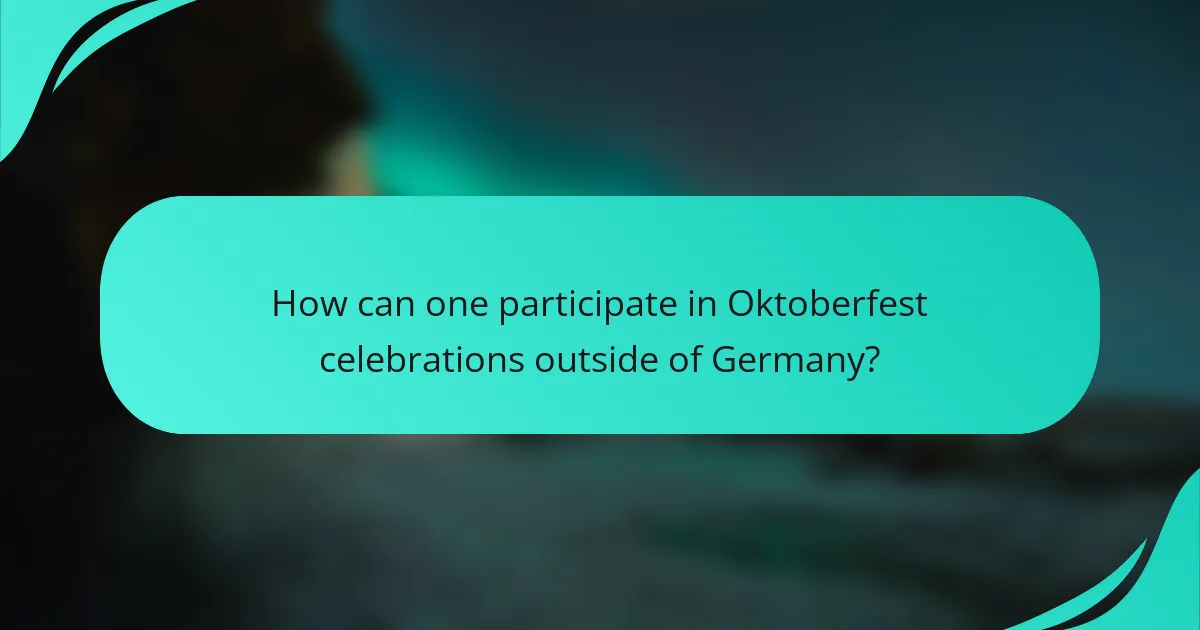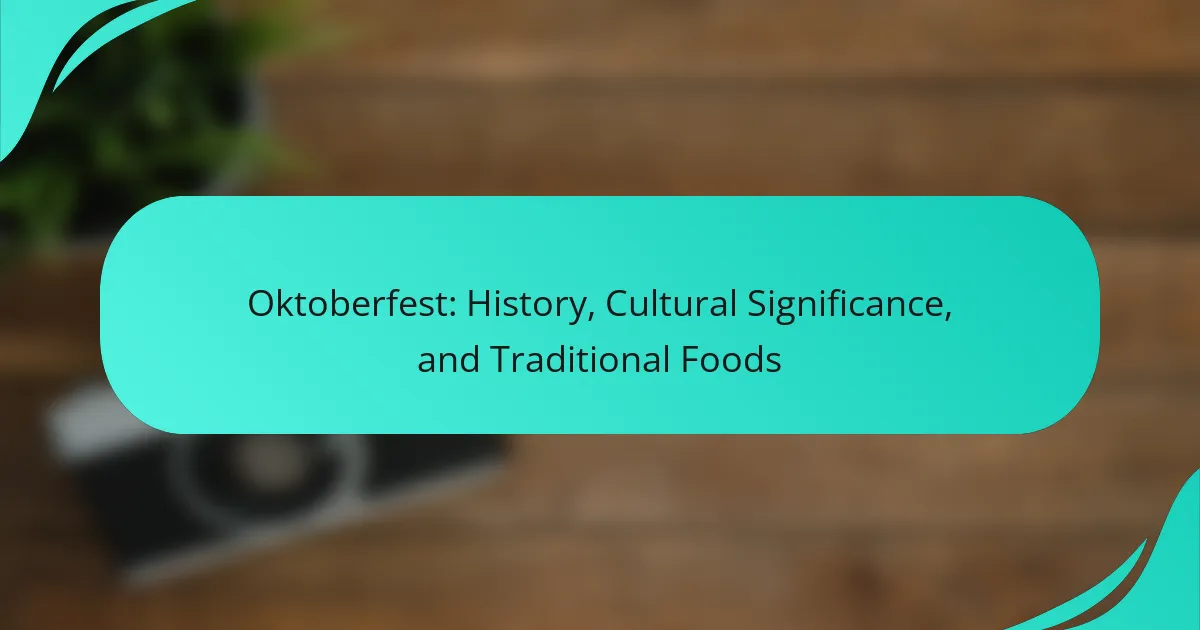Oktoberfest is a celebration of Bavarian culture that attracts millions each year. It originated in 1810 as a royal wedding festivity and has evolved into a global event. The festival highlights traditional foods like pretzels and sausages, showcases local beers, and fosters community spirit. Its cultural significance and economic impact continue to grow, making it a key highlight on the international festival calendar.

What are the origins of Oktoberfest?
Oktoberfest originated in 1810 as a royal wedding celebration for Crown Prince Ludwig of Bavaria and Princess Therese. The event was held in Munich and became an annual tradition, evolving into a major festival showcasing Bavarian culture. Key elements include traditional foods like pretzels and sausages, alongside a variety of local beers. Over time, Oktoberfest has grown internationally, attracting millions of visitors who celebrate with music, dancing, and communal feasting. Its cultural significance lies in promoting Bavarian heritage and fostering community spirit.
How has Oktoberfest evolved over the years?
Oktoberfest has evolved from a royal wedding celebration in 1810 to a global festival of beer and culture. Originally, it featured horse races and local agriculture displays. Over the years, it expanded to include diverse traditional foods, music, and amusement rides. Today, it attracts millions of visitors annually, showcasing Bavarian culture and fostering international camaraderie. The festival’s unique attribute is its transformation into a platform for cultural exchange, reflecting both local traditions and global influences.
What historical events influenced Oktoberfest’s development?
Oktoberfest’s development was influenced by the royal wedding of Crown Prince Ludwig and Princess Therese in 1810. The event marked the beginning of an agricultural fair, which evolved into the festival known today. Key historical moments include the introduction of beer tents in the mid-19th century, the establishment of the first official Oktoberfest in 1810, and the incorporation of traditional Bavarian culture. Over the years, Oktoberfest has grown in significance, attracting millions and becoming a symbol of German heritage.

Why is Oktoberfest culturally significant?
Oktoberfest is culturally significant as it celebrates Bavarian traditions, fosters community, and promotes German heritage. Originating in 1810 as a royal wedding festival, it has evolved into the world’s largest folk festival. The event showcases traditional foods, such as pretzels and sausages, alongside beer, reinforcing cultural identity. Oktoberfest also attracts millions of visitors, enhancing economic impact and global awareness of Bavarian culture.
How does Oktoberfest reflect Bavarian traditions?
Oktoberfest reflects Bavarian traditions through its authentic foods, music, and customs. The festival showcases traditional Bavarian attire like lederhosen and dirndls, emphasizing regional pride. Foods such as pretzels, sausages, and roast chicken highlight local culinary heritage. Additionally, folk music and dances create a festive atmosphere, reinforcing community bonds. The event’s origins date back to 1810, celebrating the marriage of Crown Prince Ludwig, which further cements its cultural significance in Bavaria.
What role does Oktoberfest play in modern society?
Oktoberfest plays a significant role in modern society by fostering cultural exchange and community bonding. This festival, originating in 1810, celebrates Bavarian traditions and promotes tourism. It attracts millions globally, enhancing local economies and preserving cultural heritage. Traditional foods like pretzels and sausages highlight regional cuisine, while music and dance create a vibrant atmosphere. As a result, Oktoberfest serves as a platform for cultural appreciation and connection among diverse groups.
Which communities celebrate Oktoberfest globally?
Oktoberfest is celebrated in various communities worldwide, including major cities like Munich, Chicago, and Brisbane. These events reflect local adaptations of the original Bavarian festival. Munich hosts the largest and most famous Oktoberfest, attracting millions annually. Other notable celebrations occur in places such as Kitchener-Waterloo in Canada and Cincinnati in the United States, each incorporating traditional foods, music, and cultural activities.

What traditional foods are served at Oktoberfest?
Oktoberfest features traditional foods such as pretzels, sausages, roast chicken, and pork knuckles. These dishes reflect Bavarian culture and enhance the festive atmosphere.
1. Pretzels: Soft, salty bread often enjoyed with mustard.
2. Sausages: Varieties like bratwurst and weisswurst are popular.
3. Roast Chicken: Juicy and seasoned, typically served whole.
4. Pork Knuckles: Crispy skin with tender meat, a hearty favorite.
5. Potato Salad: Often served warm, with a tangy dressing.
6. Apple Strudel: A sweet dessert made with thin pastry and apples.
Which dishes are considered staples at Oktoberfest?
Oktoberfest staples include pretzels, sausages, roast chicken, and pork knuckles. These traditional foods reflect Bavarian culture and enhance the festival experience.
1. Pretzels: Soft, salty bread often served with mustard.
2. Sausages: Varieties include Weisswurst and Bratwurst, typically grilled.
3. Roast Chicken: Juicy and seasoned, a popular choice among attendees.
4. Pork Knuckles: Crispy skin and tender meat, often paired with sauerkraut.
5. Potato Salad: A refreshing side, usually made with vinegar dressing.
6. Apple Strudel: A traditional dessert, showcasing the region’s baking heritage.
How do regional variations influence Oktoberfest cuisine?
Regional variations significantly influence Oktoberfest cuisine by incorporating local ingredients and traditional recipes. Each region of Germany contributes unique dishes, reflecting its culinary heritage. For instance, Bavaria showcases pretzels and sausages, while other areas may emphasize fish or vegetarian options. This diversity enriches the Oktoberfest experience, allowing visitors to sample a wide range of flavors that represent different German cultures. Additionally, seasonal ingredients play a role, as autumn harvests bring fresh produce into the festival’s offerings, enhancing the overall gastronomic appeal.
What beverages are iconic to Oktoberfest celebrations?
Beer is the most iconic beverage associated with Oktoberfest celebrations, particularly Märzen-style lager. Other notable drinks include apple cider and various regional wines. Traditional German beer served at the festival often features rich flavors and is brewed according to the Reinheitsgebot, ensuring purity and quality. Each year, millions of liters of beer are consumed, highlighting its cultural significance during this festive period.

How do visitors prepare for Oktoberfest?
Visitors prepare for Oktoberfest by planning their outfits, booking accommodations, and understanding the festival’s schedule. Traditional attire, such as lederhosen for men and dirndls for women, enhances the experience. Accommodations should be secured early, as hotels fill quickly. Familiarizing oneself with the event’s layout and beer tent reservations is essential for maximizing enjoyment. Additionally, visitors often research traditional foods like pretzels and sausages to fully embrace the culinary offerings.
What tips can enhance the Oktoberfest experience?
To enhance the Oktoberfest experience, consider these tips. First, arrive early to secure a good spot in the tents. Dress in traditional Bavarian attire for an authentic feel. Sample a variety of traditional foods like pretzels and sausages, and pair them with different beers to explore flavors. Participate in games and activities to engage with the festival atmosphere. Lastly, plan your transportation in advance to ensure a safe return after enjoying the festivities.
What common mistakes should be avoided during Oktoberfest?
To enjoy Oktoberfest fully, avoid common mistakes like overindulging in alcohol, neglecting traditional foods, and skipping cultural experiences. Plan your visit and be mindful of local customs.
1. Overindulging in alcohol can lead to health issues and diminish enjoyment.
2. Neglecting traditional foods means missing out on authentic culinary experiences.
3. Skipping cultural experiences reduces the festival’s significance and connection to Bavarian heritage.
4. Ignoring the festival schedule may result in missing key events and activities.
5. Disregarding attire can lessen the festive atmosphere; wearing traditional clothing enhances the experience.
6. Failing to stay hydrated can lead to fatigue and discomfort during the festivities.

What unique experiences can one find at Oktoberfest?
Oktoberfest offers unique experiences such as traditional Bavarian music, authentic German foods, and vibrant cultural parades. Visitors can engage in activities like folk dancing, savoring unique beer varieties, and participating in contests. The festival’s atmosphere is enriched by its historical significance, showcasing centuries of Bavarian heritage. Unique beer tents, each with distinct themes, provide an immersive experience, allowing guests to explore regional flavors and customs.
Which entertainment options are available at the festival?
Oktoberfest offers a variety of entertainment options, including traditional music, dance performances, and amusement rides. Guests can enjoy live bands playing folk music, participate in folk dance, and experience thrilling rides like roller coasters and Ferris wheels. The festival atmosphere is enriched with parades featuring traditional costumes, showcasing the cultural significance of Bavarian heritage. Additionally, there are games and activities for all ages, making it a family-friendly event.
What unique cultural activities are featured at Oktoberfest?
Oktoberfest features unique cultural activities such as traditional Bavarian music, folk dances, and parades. Guests enjoy performances by brass bands, showcasing polka and folk tunes. The festival also includes traditional games like hammer throwing and contests that celebrate Bavarian heritage. Additionally, the ceremonial tapping of the first keg marks the official start of the festival, highlighting its historical significance.

How does Oktoberfest impact the local economy?
Oktoberfest significantly boosts the local economy by attracting millions of visitors annually. This influx stimulates various sectors, including hospitality, retail, and transportation. In 2019, the festival generated over €1 billion in economic impact, supporting thousands of jobs. Local businesses benefit from increased sales, while the city of Munich gains substantial tax revenue. The event also promotes cultural tourism, enhancing the region’s global profile.
What are the economic benefits of hosting Oktoberfest?
Hosting Oktoberfest generates significant economic benefits, including increased tourism, job creation, and local business revenue. The festival attracts millions of visitors, leading to a surge in hotel bookings, restaurant patronage, and retail sales.
For instance, a study indicated that Oktoberfest contributes over 1 billion euros to the local economy annually. This influx supports various sectors, from hospitality to transportation. Additionally, the event creates thousands of temporary jobs, enhancing community employment rates.
The festival also promotes local culture and products, encouraging the growth of regional breweries and artisans. As a result, Oktoberfest serves as a catalyst for long-term economic development and cultural tourism.
How does Oktoberfest contribute to tourism in the region?
Oktoberfest significantly boosts tourism in the region by attracting millions of visitors annually. This festival showcases Bavarian culture, traditional foods, and local brews, creating a unique experience. In 2019, Oktoberfest welcomed over 6 million attendees, generating substantial economic benefits for local businesses. Additionally, the event promotes cultural exchange, drawing international tourists and enhancing the region’s global profile. The festival’s historical significance further enriches its appeal, making it a key attraction in Bavaria.

What are the environmental considerations of Oktoberfest?
Oktoberfest has significant environmental considerations, including waste management, resource consumption, and carbon footprint. The festival generates substantial waste, prompting organizers to implement recycling initiatives. Energy and water usage are also critical, as the event attracts millions. Sustainable practices aim to minimize negative impacts on local ecosystems.
How is Oktoberfest addressing sustainability issues?
Oktoberfest is actively addressing sustainability issues through various initiatives. The festival has implemented measures to reduce waste, promote recycling, and source food locally. These efforts include using biodegradable materials for utensils and cups, which minimizes environmental impact. Additionally, Oktoberfest encourages public transportation to reduce carbon emissions and has established a comprehensive waste management system to ensure proper disposal and recycling of materials. These sustainable practices enhance the festival’s cultural significance while promoting environmental responsibility.
What initiatives promote eco-friendliness at the festival?
Oktoberfest promotes eco-friendliness through various initiatives. These include waste reduction programs, sustainable sourcing of food and beverages, and the use of biodegradable materials. The festival encourages public transportation, reducing carbon emissions. Additionally, organizers implement recycling and composting systems to manage waste effectively.
What lessons can be learned from Oktoberfest’s sustainability efforts?
Oktoberfest’s sustainability efforts teach valuable lessons about environmental responsibility and community engagement. The festival emphasizes waste reduction through recycling and composting initiatives. Local sourcing of food and beverages supports regional economies and minimizes carbon footprints. Additionally, the use of renewable energy sources showcases the importance of sustainable practices in large events. These strategies can inspire other festivals to adopt eco-friendly measures.

How can one participate in Oktoberfest celebrations outside of Germany?
You can participate in Oktoberfest celebrations outside of Germany by attending local festivals, joining themed events, or hosting your own celebration. Many cities worldwide hold Oktoberfest events that feature traditional music, food, and beer.
Local festivals often replicate the authentic atmosphere with Bavarian decorations and activities. Joining a local beer garden during the festival season can also enhance the experience. Additionally, you can host an Oktoberfest gathering at home, complete with traditional dishes like pretzels and sausages, and serve German beers.
These celebrations foster cultural exchange and community engagement, allowing participants to enjoy the spirit of Oktoberfest regardless of location.
What are the best Oktoberfest events in North America?
The best Oktoberfest events in North America celebrate German culture with traditional foods, music, and beer. Notable events include the Oktoberfest Zinzinnati in Ohio, the largest in the U.S., featuring over 500,000 attendees. Other significant celebrations are the Mount Angel Oktoberfest in Oregon, known for its authentic German cuisine, and the Denver Oktoberfest, which combines local craft beers with traditional German brews. Each event showcases unique attributes, such as regional food specialties and cultural performances, enriching the Oktoberfest experience across North America.
How can one recreate the Oktoberfest experience at home?
To recreate the Oktoberfest experience at home, focus on traditional foods, beverages, and festive decorations. Start by preparing classic dishes like pretzels, sausages, and schnitzel. Pair these with authentic German beers, preferably from Munich. Decorate with blue and white colors, reminiscent of the Bavarian flag, and set up long tables for communal dining. Incorporate music by playing traditional German folk tunes to enhance the atmosphere.
What resources are available for planning an Oktoberfest event?
To plan an Oktoberfest event, utilize resources like local breweries, cultural organizations, and event planning guides. These entities provide essential information on traditional foods, entertainment options, and logistics. Local breweries often offer partnerships for authentic beer selections, while cultural organizations can assist with maintaining the festival’s heritage. Event planning guides outline best practices for organizing large gatherings, ensuring a successful celebration.
